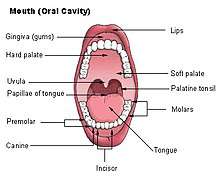uvula
English
WOTD – 4 November 2008

Uvula
Etymology
Borrowed from Late Latin ūvula (“little grape”), diminutive of Latin ūva (“grape”).
Pronunciation
- (UK) IPA(key): /ˈjuːv.jʊ.lə/
- (US) IPA(key): /ˈjuːv.jə.lə/
Audio (US) (file) Audio (AU) (file) - Homophone: uvular (in non-rhotic accents)
Noun
uvula (plural uvulas or uvulae or uvulæ)
- (anatomy) The fleshy appendage that hangs from the back of the palate, that closes the nasopharynx during swallowing.
- (anatomy) The slight elevation in the mucous membrane immediately behind the internal urethral orifice of the urinary bladder, caused by the middle lobe of the prostate.
- (music) An object so suspended inside a bell that it may hit the bell and cause it to ring; a clapper.
Usage notes
- The Oxford English Dictionary (second edition, 1989) marks this word as not naturalized in English.
Synonyms
- (appendage hanging from the palate): palatine uvula, tonsils, staphyle
Translations
appendage that hangs from the palate
|
|
French
Etymology
Unadapted borrowing from Late Latin ūvula (“small grape”), diminutive of Latin ūva. Doublet of uvule, another borrowing.
Pronunciation
- IPA(key): /y.vy.la/
Malay
Etymology
From Late Latin ūvula (“little grape”), diminutive of Latin ūva (“grape”).
Pronunciation
- IPA(key): /uvula/
Noun
uvula (Jawi spelling اوۏولا, plural uvula-uvula, informal first-person possessive uvulaku, informal second-person possessive uvulamu, third-person possessive uvulanya)
Synonyms
This article is issued from
Wiktionary.
The text is licensed under Creative
Commons - Attribution - Sharealike.
Additional terms may apply for the media files.